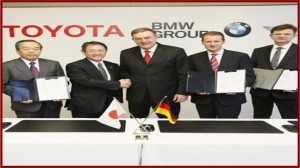BMW Group and Toyota Motor Corporation today in Japan signed a contract for the joint development of a fuel cell system, a new architecture and components for a sports vehicle, and research in lightweight technologies. These agreements build from a memorandum of understanding signed in June 2012. (Read AutoInformed on BMW Group and Toyota Motor Expand Collaboration)
“People need to move around. I’m sure we can all agree on this truism,” said Herbert Diess, Member of the Board of Management of BMW AG. “And the possibilities for the individual mobility of tomorrow represent an entirely new approach to the vehicle.”
The agreement follows a growing expansion of the first memorandum of understanding announced by the two companies on 1 December 2011, which was extended today to research on lithium-air batteries, a new chemistry. This agreement marks the second phase of collaborative research into next-generation lithium-ion battery cells that commenced in March 2012. (See BMW and Toyota to Jointly Research Lithium Ion Batteries)
Current production Toyota hybrids use nickel metal hydride batteries, an older but thoroughly proven technology. Toyota has been reluctant to use the newer, more expensive technology, much loved by environmentalist, but shunned thus far by mainstream car buyers. Nevertheless, Toyota is introducing its first generation of lithium ion batteries in the Prius Plug-in hybrid now on sale in the U.S.
The BMW Group and Toyota Motor collaboration is the latest example of automakers trying to decrease the astronomical cost of developing more efficient vehicles that are mandated by increasingly stringent fuel economy or CO2 regulations.
Toyota Motor Europe and BMW Group now have a contract for BMW to supply 1.6-liter and 2-liter diesel engines to TME starting in 2014. Since Toyota does not produce Lexus luxury models in Europe, no direct marketing conflict is immediately apparent. The rising value of the Yen has forced a reluctant Toyota to increase production and sourcing of components outside of its home market in Japan where it is a major contributor to Japanese economic and social well being as the biggest automaker operating there.
In a statement today, the companies’ said they are convinced that fuel cell technology is one of the solutions necessary to achieve zero emissions. BMW Group and TMC will share their technologies and jointly develop a fuel-cell vehicle system, including not only a fuel cell stack and system, but also a hydrogen tank, motor and battery. The work is supposed to be completed by 2020. The companies will also develop standards for the hydrogen infrastructure, which are necessary for the popularization of fuel cell vehicles.
“It is just over a year since we signed our collaborative MoU, and with each day as our relationship strengthens, we feel acutely that we are making steadfast progress,” said Akio Toyoda, President of TMC.
The companies also agreed to set-up a feasibility study to define a joint platform concept for a mid-size sports vehicle that is to be completed by the end of 2013. As part of this study and with much wider possible applications BMW and Toyota will also jointly develop lightweight technologies for vehicle bodies using reinforced composites, with an eye to utilize these technologies in cooperation on the joint development of a sports-vehicle platform as well as other BMW and TMC vehicles.


